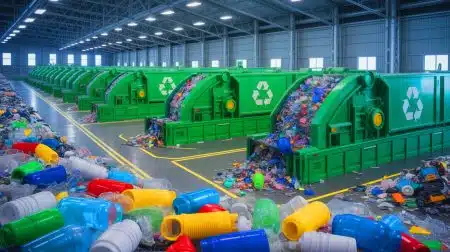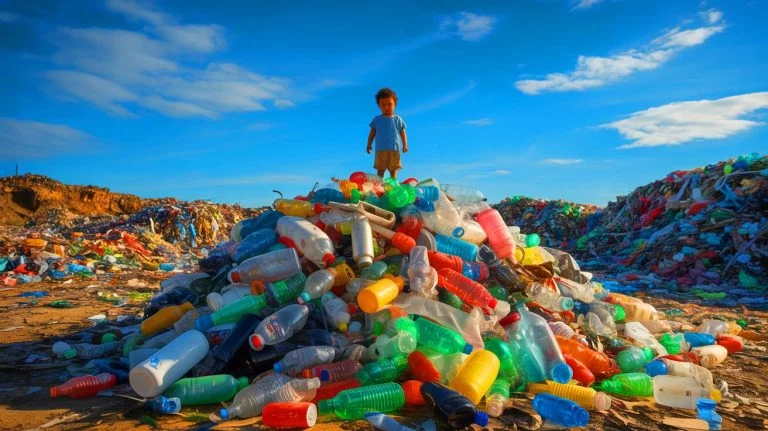| IN A NUTSHELL |
|
In recent years, the surge in plastic production has highlighted the growing environmental and health crises facing our planet. Experts now argue that plastic pollution is a full-scale public health emergency. A new report underscores the profound impact of plastic on both human and planetary health, revealing alarming costs and consequences that demand urgent action. The report warns of a “grave” plastics crisis, with detrimental effects on individuals at every stage of life, from infants to adults. As plastic production continues to soar, reaching unprecedented levels, the world must confront the challenges posed by this pervasive material.
The Alarming Growth of Plastic Production
Plastic production has increased more than 200 times since 1950, driven by demand for convenience and disposability. This growth trajectory has been staggering, with expectations that production will nearly triple by 2060, surpassing one billion tons annually. While plastics play a vital role in several industries, the most significant increase stems from single-use items like fast-food containers and beverage bottles. These products contribute to the staggering volume of plastic waste that pollutes our environment.
Plastic pollution now spans the globe, from the highest peaks to the deepest ocean trenches. It is estimated that more than 8.8 billion US tons of plastic waste have accumulated worldwide. Shockingly, less than 10 percent of all plastic ever produced has been recycled. This staggering statistic highlights the urgent need for comprehensive global solutions to curb plastic production and waste.
Health Impacts of Plastic Pollution
The health implications of plastic pollution are profound and far-reaching. Plastics are composed of more than 16,000 chemicals, including fillers, stabilizers, dyes, and flame retardants, many of which pose serious health risks. The report reveals that exposure to these chemicals is linked to a range of adverse health effects, including increased risks of miscarriage, premature birth, childhood cancer, and fertility issues. The presence of microplastics and nanoplastics in human bodies, detected in places like blood and bone marrow, raises further concern.
Moreover, the production of plastics contributes significantly to air pollution and CO₂ emissions. It is estimated that plastic production releases 2.2 billion US tons of CO₂ annually, surpassing the total emissions of some major countries. This not only exacerbates climate change but also affects air quality, with open-air burning of plastic waste compounding the problem.
Recycling: An Inadequate Solution
While recycling has long been promoted as a solution to plastic pollution, the report emphasizes its limitations. Unlike materials such as glass or paper, plastics are chemically complex, making effective recycling challenging. The current recycling systems are insufficient to handle the vast quantities of plastic waste generated. Consequently, more than half of plastic waste remains unmanaged and is often incinerated, further harming the environment.
Petrostates and industry groups advocate for recycling-focused efforts, but the report argues that a more comprehensive approach is needed. Policymakers must consider the entire lifecycle of plastics, from production to disposal. This includes reducing reliance on fossil fuels, improving waste management systems, and enhancing transparency about the chemicals used in plastic products.
International Efforts and Future Challenges
The urgency of the plastics crisis has prompted international discussions on establishing a global plastics treaty. More than 100 countries support measures to cap plastic production and protect human and environmental health. However, these efforts face opposition from oil-rich nations and industry lobbyists. The upcoming negotiations will be crucial in determining the future course of action.
Experts emphasize the importance of including comprehensive measures in the treaty to address the crisis effectively. Vulnerable populations, such as infants and children, are disproportionately affected by plastic pollution, underscoring the need for equitable and inclusive solutions. As the world grapples with the complex challenges of plastic pollution, the call for decisive action is more critical than ever.
The report on plastic pollution paints a stark picture of a crisis that demands immediate attention. As plastic production continues to rise, the associated health and environmental costs are becoming increasingly untenable. Can global leaders come together to implement effective solutions that safeguard both human health and the environment for future generations? The world watches and waits for decisive action.
Did you like it? 4.6/5 (26)






Wow, $1.5 trillion? 😱 That’s mind-blowing! How can we even start to tackle such a massive problem?
Isn’t it time we find alternatives to plastic? There must be better solutions out there!
Great article! Thanks for shedding light on such an important issue. 🌍
Are there any countries that are doing a particularly good job at managing plastic waste?
Why is plastic still so widely used if it’s causing so much damage?
Recycling sounds like a good idea, but why is it so ineffective with plastics?
Is there a way to reverse the damage already done by plastic pollution?
What are the main barriers to establishing a global plastics treaty?
Does this mean I should stop using plastic altogether? That seems impossible! 😅